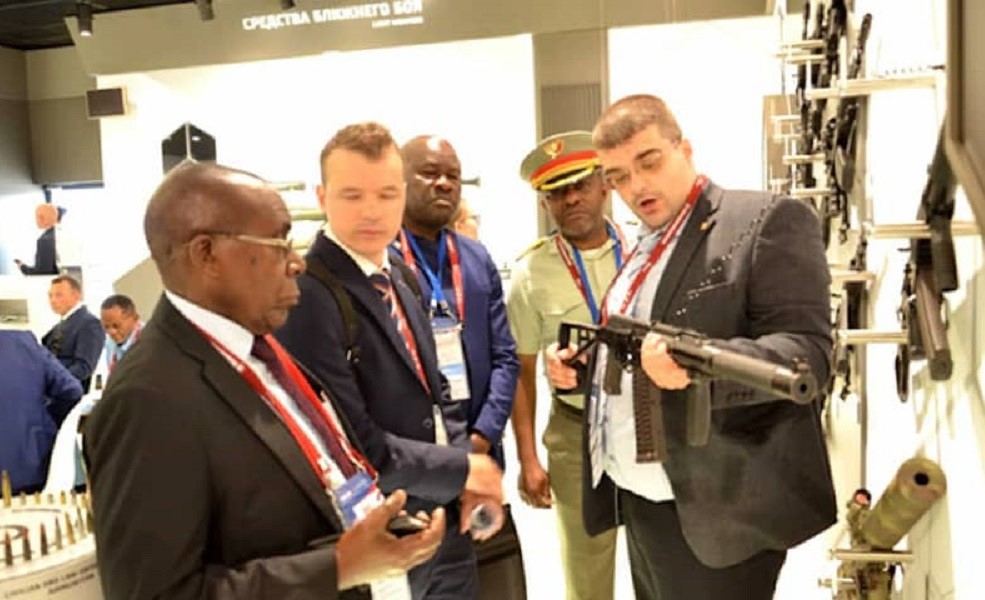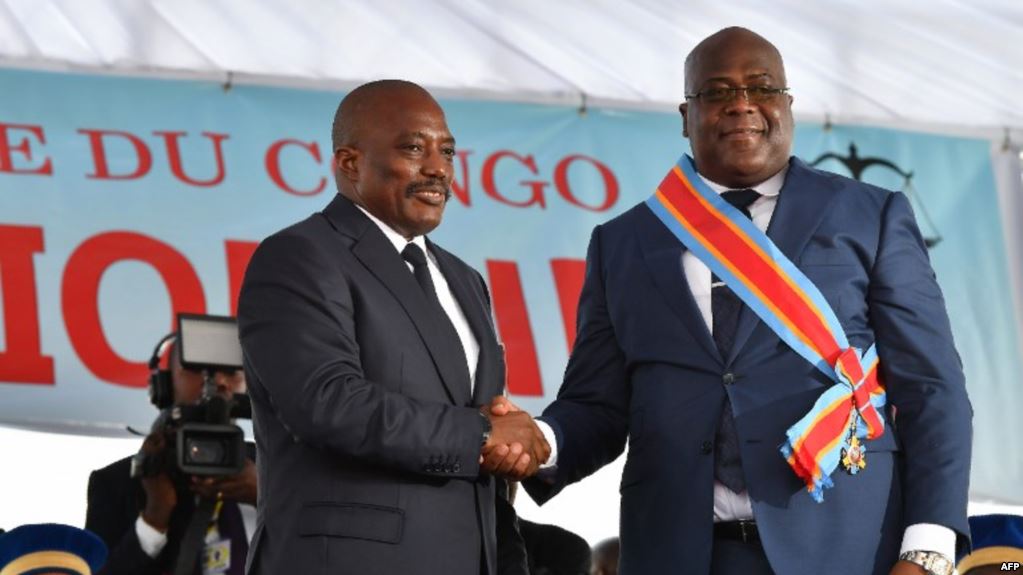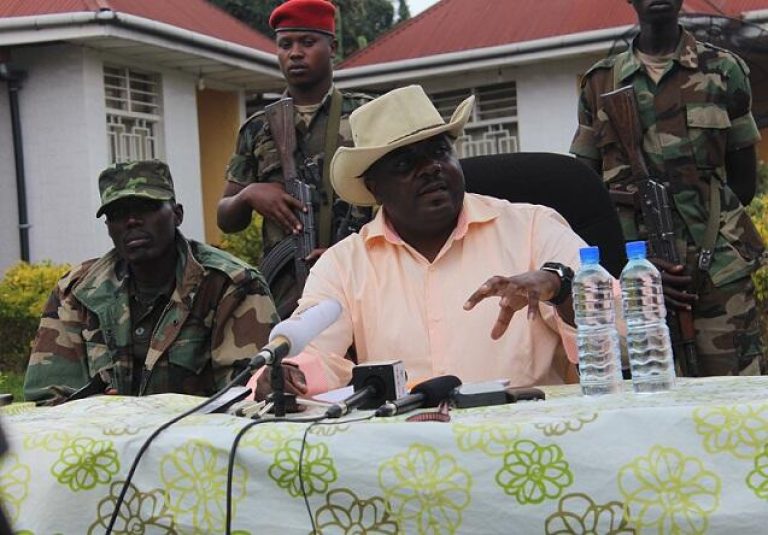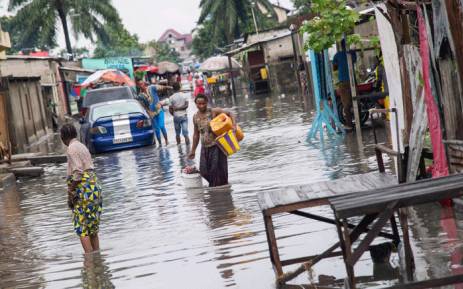Regional
DRC: Foreign mercenaries will escalate conflict in east

DRC Defence Minister Gilbert Kabanda Kurhenga inspecting arms in Russia in August 2022 as Kinshasa anticipated the lifting of the UN arms embargo. His government has now set in motion plans to hire Russian and French mercenaries to battle the M23 rebels.
In
1914, during World War I, Germany and English soldiers who were at war made a
rare truce. They came out of their trenches to play football on Christmas Day.
It was a unique truce that showed trust and quest for peace on both sides. It
came to be called the Christmas Truce.
As
the world prepared to celebrate Christmas, a moment to reflect on acts of love
and peace, in remembrance of the birth of Jesus Christ, my mind came to the war
between the Democratic Republic of Congo forces, FARDC, and the M23 rebels.
Could they forge a similar truce?
Alas! I later found out that I
was daydreaming.
Instead
of forging a truce, DRC President, Félix Tshisekedi, was busy planning a bigger
war than before. This happens at a time the M23 rebels were voluntarily withdrawing
from captured territories in a goodwill gesture to give peace a chance and
prepare for political negotiations.
Following
a visit to Moscow in late August by DRC Defense Minister, Gilbert Kabanda,
Western diplomats in Africa expressed concern about a possible deployment of
the Wagner Group, also known as PMC Wagner, a Russian paramilitary organization
variously described as a private military company, or a network of mercenaries,
in DRC.
Wagner,
a Russian private military founded by Yevgeny Prigozhin, has been accused of
human rights violations in Mali and the Central Africa Republic. The fear by
Western diplomats has now become a reality.
Reliable sources informed this website that Tshisekedi hired 100 Wegner
Group mercenaries and 103 Ex-French Legionnaires, flown from Bucharest in
Romania. They landed in Goma on December 22 and were accommodated in Mbizi
hotel.
While
attending the Financial Times (FT) Africa Summit in October 2022, Tshisekedi
denied he had plans to use mercenaries in DRC, although it was well known that
he had already started negotiations with the Russians. When asked in an
interview with FT, on plans to use the Wegner Group mercenaries, Tshisekedi
said, “I know it’s fashionable now . . . [but] no, we don’t need to use
mercenaries, I don’t even know where to find them.” Although FT reporters Roula
Khalaf, Davidi Pilling and Andres Schipan called the response a joke,
Tshisekedi knew he was openly telling a lie, since his Defense Minister had
already initiated discussions with the Russian mercenaries for hire.
Tshisekedi’s
resorting to use mercenaries is evidence that his national army which is
supported by armed terror groups like FDLR and Mai Mai factions failed to
defeat the M23 rebels which Kinshasa refused to recognize as Congolese
nationals fighting for a legitimate cause. Kinshasa insists that the rebels are
terrorists who have to be removed from DRC territory by force.
By
resorting to use mercenaries, it is clear that Tshisekedi is desperate. His
move contradicts ongoing efforts under the Luanda Memorandum of Understanding
as well as the Nairobi Initiative to restore peace in his volatile
country.
The
presence of mercenaries in DRC should be condemned by the region and the
international community as it undermines the decision by the East African
Community Heads of State Summit to deploy the East African Community Regional
Force (EACRF), which is currently on the ground implementing the peace process
roadmap. The EACRF came reinforcing thousands of UN troops (MONUSCO) which have
been on the ground for years but only worsening the crisis.
During
the December 13-15 US-Africa Leaders’ Summit in Washington DC, Tshisekedi deliberately skipped an EAC Summit
organized on the sidelines to discuss the implementation of the peace process
in eastern DRC. He lied to his colleagues that he had another important meeting
in the White House. This was evidence that the DRC leader does not want peace
as he prepared for war.
The
decision by the United Nations Security Council mid this month to lift a nearly
two decades old arms embargo could have been a big mistake driven by Western
countries’ greed to appease Kinshasa so that they can maintain
lucrative mineral business deals. The presence of mercenaries means unlimited
arms flowing into a corrupt DRC. Such arms will end in the hands of armed
terror groups operating in DRC.
By
lifting the arms embargo on DRC, the Security Council therefore opened up
another dangerous window that will allow proliferation of illegal arms in the
Great Lakes Region. Although Arms sales
to non-governmental armed groups are still banned, the mercenaries belong to
this category. The UNSC decision will undoubtedly add fuel to an already
burning fire.
Tshisekedi
has mobilized Congolese people from different backgrounds to demonstrate
against Rwanda, M23 rebels and MONUSCO. He has allowed hate speech and violence
against the Tutsi in various parts of the country. He has allowed sanctioned
terror groups to fight along with FARDC, hoping to defeat M23 rebels, but the
strategy has failed.
By
hiring Russian and French mercenaries, Tshisekedi believes he will wipe out the
M23 rebels whom he branded as terrorists. Ironically, as Tshisekedi is openly
rejecting the peace roadmap, the US and EU countries are pointing accusing
fingers at Rwanda for allegedly supporting M23, yet the same superpowers keep
a blind eye on acts of the Kinshasa government aimed at frustrating the peace
process.
The
terror groups working with FARDC have caused enough havoc in eastern DRC where
Congolese Tutsi have been brutally killed, and acts of genocide have been
documented. The presence of foreign mercenaries will not solve the decades’
long crisis but will only escalate the already volatile conflict in eastern
DRC.







